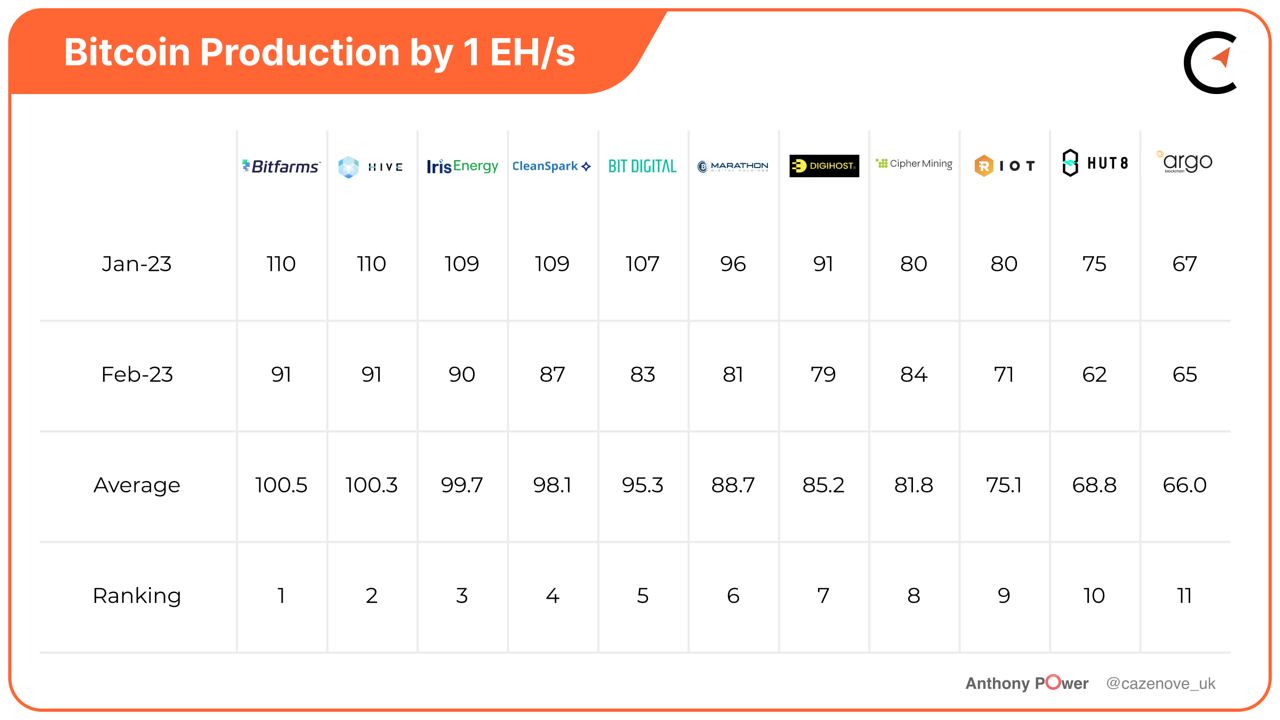

Spring is within sight, but perhaps not for Bitcoin miners. North America’s publicly listed Bitcoin miners continued to battle the old foes of stagnant Bitcoin price and rising network difficulty, flat at $23,147 per Bitcoin and rising 12% compared to the previous month, respectively.
Network hashrate–a measurement of hashes contributed to the Bitcoin network in the process of mining–started the month of February at 276 EH/s and ended the month at 298 EH/s, according to Hash Rate Index. The 8% increase in network hashrate over the month–following a January increase of 9%–lends itself to the question: who can keep up with upward march in hashrate?
This article includes updates on 11 publicly listed miners. Scroll below to see a recap of each miner’s production.
Summary
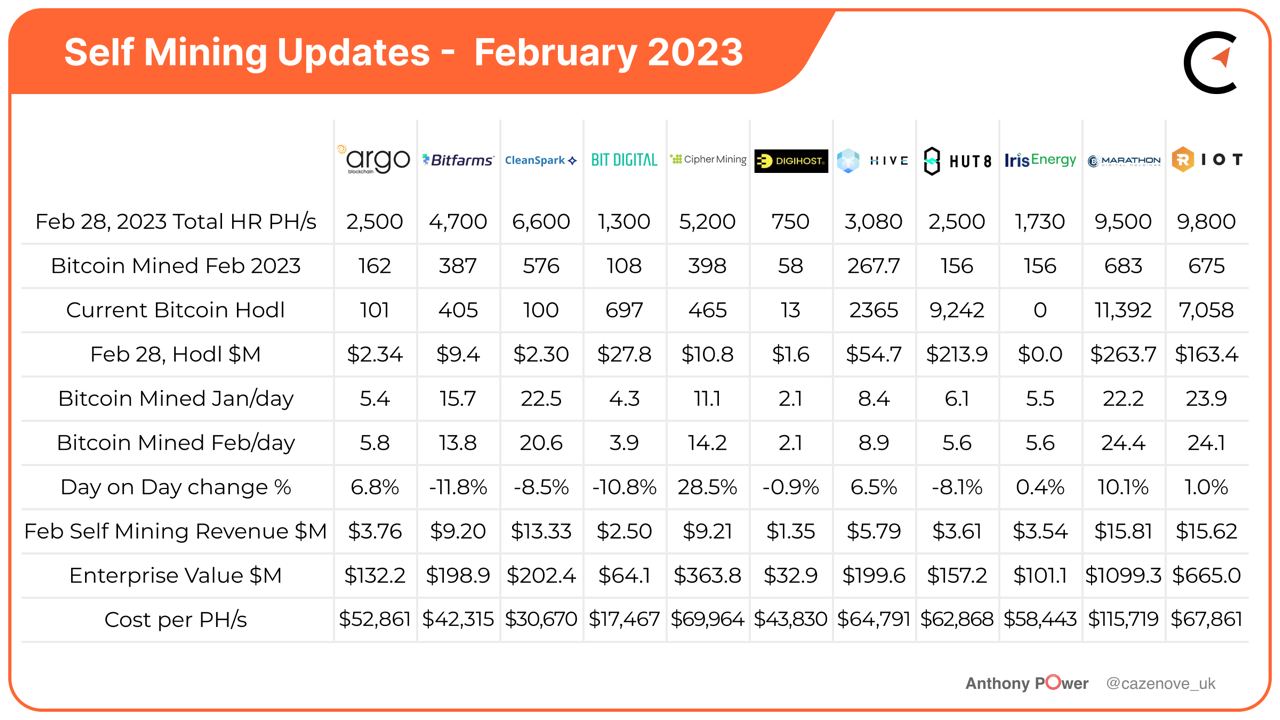
‘Hashrate utilization (more on this below) shows that North American listed miners are achieving, on average, an uptime of 88% of their installed hashrate.
- Both Cipher Mining and Marathon Digital increased their operational hashrates during February more than the network average, by 21% and 30% respectively.
- Following two years of hodling, Hut 8 has sold some Bitcoin.
Argo Blockchain (ARB.L, ARBK)
Peter Wall stepped down as CEO and Interim Chairman of Argo Blockchain on February 9. Chief Operating Officer Seif El-Bakly has stepped up to Interim CEO, whilst the company actively recruits a replacement, and Matthew Shaw has been appointed Chairman of the Board. This change follows the recent departure of Alex Appleton, CFO, on January 29. The company has appointed BDO Canada LLP to assist the interim CEO, with accounting and advisory services whilst they search for a replacement.
Although the company did not increase its hashrate during the month, it was able to increase its daily production by 6.8%, producing 162 Bitcoin at a rate of 5.8 Bitcoin per day for $3.8 million in revenue. The company has a current hodl of 101 Bitcoin, having sold 176 coins during the month to cover their operational requirements.
Cipher Mining (CIFR)
Since December 2022, Cipher Mining has issued monthly mining updates, and I have, therefore decided to incorporate them into my analysis.
The company produced a total of 398 Bitcoin during February at an average daily rate of 14.2 Bitcoin per day, a daily increase of 28.5% on the previous month. This was due to the deployment of 7,710 new Bitmain and MicroBT miners, providing an increase in hashrate of 0.9 EH/s and bringing the new total hashrate to 5.2 EH/s–an increase of 21% on the previous month.
The company sold 357 Bitcoin during the month to cover both operational and significant capital costs at their Odessa site, thereby avoiding dilution and expensive debt related options.
Hive Blockchain (HIVE)
Hive Blockchain produced 250 Bitcoin in February from its ASIC and GPU mining, at a daily rate of 8.9 Bitcoin per day, an increase of 6.5% on the previous month. The company increased its operational hashrate and achieved 3.08 EH/s during the month. Hive Blockchain is due to receive a further 645 BuzzMiners in the next two months, representing a total production quantity of 6,300 of its own Bitcoin ASIC miners powered by the Intel Blockscale ASIC.
The company sold 267.7 Bitcoin during the month of February to cover operational and capital growth costs and have a current Bitcoin hodl as at March 2nd, of 2,365 BTC with a value of $54.7 million.
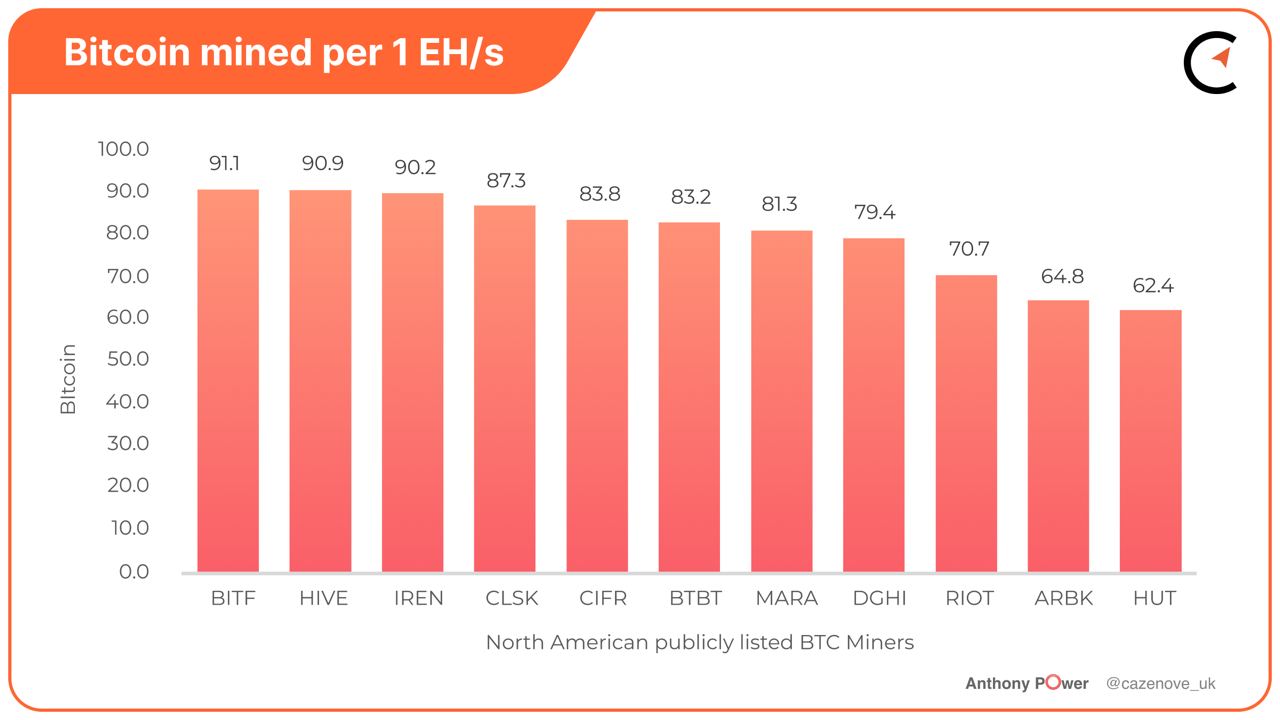
Marathon Digital (MARA)
Marathon Digital had a good month producing 683 Bitcoin at an average rate of 24.4 Bitcoin per day, an increase of 10.1% on the previous month’s daily rate. The operational hashrate increased by 30% to 9.5 EH/s, due 19,000 Bitcoin miners energizing during the month. Over half of which were S19 XP mining rigs with higher efficiency and terahash than most stock miners.
The company has a further 4.5 EH/s installed units awaiting energization, for a total of 14 EH/s of a planned 23 EH/s.
Read: Bitmain changed its ASIC design. Miners need to be ready
Marathon Digital sold 650 Bitcoin in February to support monthly operations, and has a hodl 11,392 Bitcoin. Approximately 8,260 Bitcoin are unrestricted, with a value of $191.2 million. The company also ended the month with $219.7 million in unrestricted cash on hand.
Marathon Digital announced that it had terminated its credit facilities with Silvergate Bank on March 8, 2023, after the announcement of Silvergate’s planned liquidation, including a $50 million loan and unused revolving line of credit. This repayment has reduced the debt held by the company by $50 million and at the same time freed up $75 million in crypto assets that were being held as collateral, and saved interest and facility costs of $5 million per annum.
Riot Platforms (RIOT)
Riot Platforms produced 675 Bitcoin in February 2023 at an average daily rate of 24.1 Bitcoin per day, an increase of 1% on the previous month.
The company deployed 4,608 S19 miners, with a further 2,304 miners staged for deployment. The total current deployed fleet of 87,264 miners will shortly increase to 89,568 increasing the operational hashrate to 10.1 EH/s.
These figures do not include the 17,040 miners or approximately 2.5 EH/s currently offline in Buildings F and G, where efforts are currently focused on restoring the damage done to the dry-cooling systems by the winter storm in Texas in late December. Building F is now back online and expected to return to full operational capacity in early Q2 2023. Building G, after the repairs are complete and several dry coolers replaced, the company expects to restore full operational capacity in the second half of 2023.
Riot Platforms sold 600 Bitcoin in February for a total of $14.2 million to cover operational costs and has a current hodl of 7,058 Bitcoin valued at $163.4 million. Along with cash reserves in excess of $230 million as reported as at December 31, 2022, the company’s industry-leading financial strength puts them in a strong position to continue executing on their aggressive growth plans, in 2023 and beyond.
Hashrate Utilization
There are many mining metrics worth considering other than the Bitcoin produced by EH/s. The majority of the miners, in the table above, are now including their average monthly ‘operational hashrate,’ providing the reader with a more accurate account of their machine uptime.
Another metric also worthy of consideration is a company’s Hashrate Utilization. This metric takes account of the fully installed hashrate, each month, to determine the optimum level of Bitcoin rewards achievable as a percent of the average monthly global hashrate and compares this to the amount of rewards or Bitcoin physically produced.
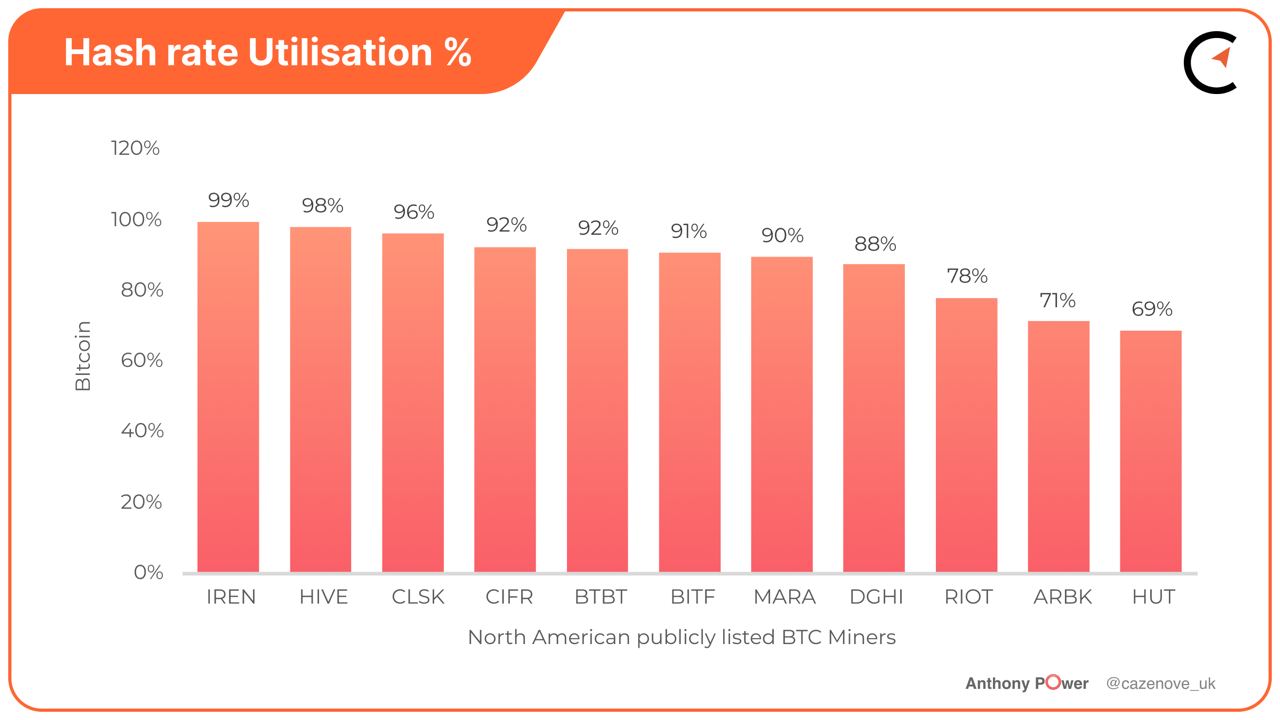
We assume that the machines are installed in a linear manner throughout the month to provide some reasonableness when determining the fully installed hashrate in the case where a miner does not provide guidance on the deployment schedule.
The table above highlights the utilization for each miner during the month with Iris Energy (IREN) achieving a commendable 99% uptime in hashrate. As expected, Hive Blockchain, CleanSpark (CLSK) and Bitfarms all achieved above 90% with Cipher Mining and Bit Digital both achieving 92% utilization.
Bitcoin Sold
The graph below highlights the amount of Bitcoin each miner has sold during the month of February. Even Hut 8 (HUT), a company with the largest self-mined Bitcoin stack, has finally started to sell some to cover operational costs rather than seeking other financial options with less attractive terms. Marathon Digital only recently announced their strategy to sell an element of their Bitcoin produced each month, a strategy currently adopted by Riot Platforms, to also cover costs.
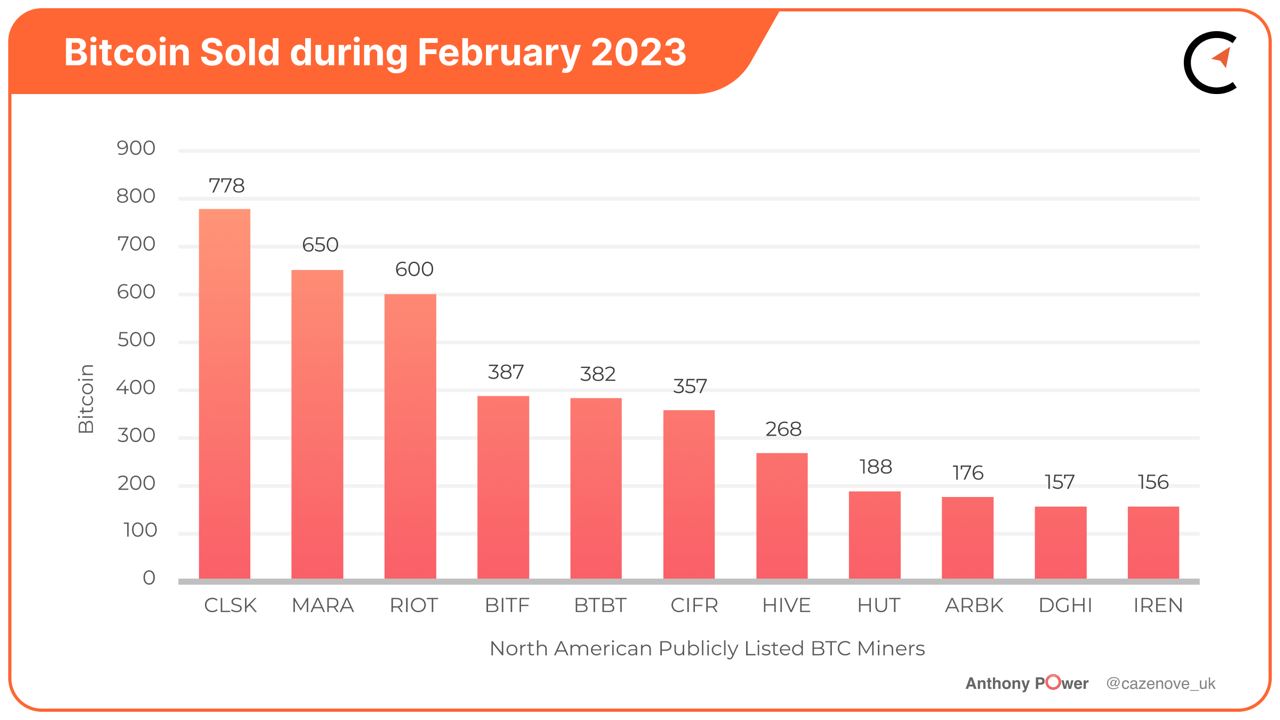
Bitcoin Hodl
The costs of expanding and utilizing the debt markets has impacted a number of the miners below, who have effectively been forced to sell their Bitcoin at the bottom of the market to stay afloat. However, companies like Bit Digital (BTBT), Iris Energy, CleanSpark and Digihost Technology (DGHI) have regularly sold their Bitcoin to fund their operational and capital growth and now operate with little or no debt on their respective balance sheets.
Now that Marathon Digital have repaid their $50 million loan to Silvergate Bank they have an unencumbered stack of Bitcoin valued at $263.7 million, as of end of February. Hut 8 and Riot Platforms also have considerable value in their hodl to provide much needed liquidity as they navigate through this bear cycle.
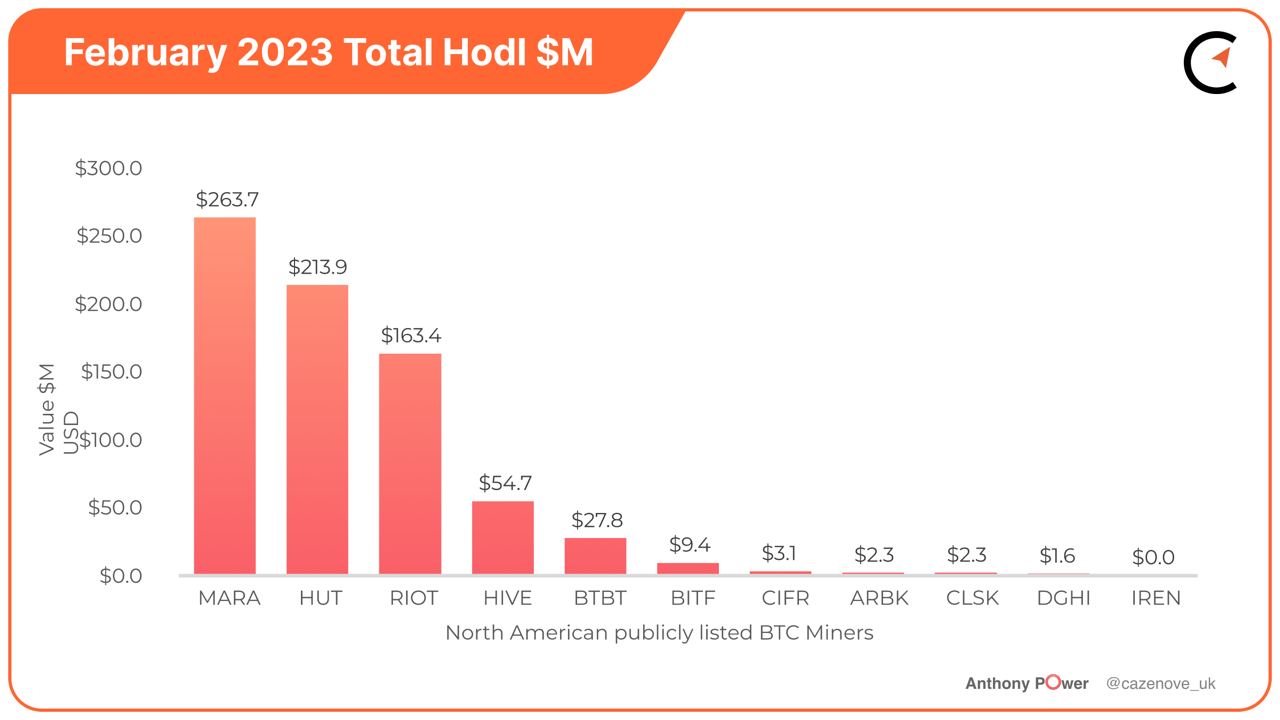
Year-to-date Bitcoin production by EH/s
It comes as no real surprise that the miners holding the top four positions for producing the highest levels of Bitcoin by EH/s in 2022 are continuing the trend in 2023. With Bitfarms currently ahead of Hive Blockchain, Iris Energy and CleanSpark.
Bit Digital gets a notable mention, while Marathon Digital have started to show real improvement in early 2023 and appear to be finally getting back on track with their growth and energization strategy.
